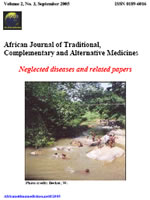
|
African Journal of Traditional, Complementary and Alternative Medicines
African Ethnomedicines Network
ISSN: 0189-6016
Vol. 14, No. 4, 2017, pp. 22-30
|
 Bioline Code: tc17109
Bioline Code: tc17109
Full paper language: English
Document type: Research Article
Document available free of charge
|
|
|
African Journal of Traditional, Complementary and Alternative Medicines, Vol. 14, No. 4, 2017, pp. 22-30
| en |
NEUROPROTECTIVE EFFECT OF TERMINALIA CHEBULA  EXTRACTS AND ELLAGIC ACID IN PC12 CELLS EXTRACTS AND ELLAGIC ACID IN PC12 CELLS
Shen, Yuh-Chiang; Juan, Chi-Wen; Lin, Che-San; Chen, Chien-Chih & Chang, Chia-Lin
Abstract
Background: Alzheimer’s disease (AD) is one of the common neurodegenerative disorders among elderly. The
purpose of this study was to determine the neuroprotective effect and mechanisms of action underlying the Terminalia
chebula extracts and ellagic acid by using beta-amyloid25-35 (Aβ25-35)-induced cell toxicity in an undifferentiated
pheochromocytoma (PC12) cell line.
Materials and Methods: The T. chebula extracts were prepared using the methanol, water, and 95% ethanol.
Specifically, the ellagic acid was obtained in our laboratory. Assays including cell toxicity and changes in intracellular
reactive oxygen species (ROS) and calcium level were evaluated to examine the neuroprotective effects and
mechanisms of the T. chebula extracts and ellagic acid.
Results: The methanolic and water extracts of T. chebula and ellagic acid exhibited the strongest neuroprotective
activity against Aβ25-35-induced PC12 cell damages at 0.5–5.0 µg/ml. The ellagic acid also exhibited partial
neuroprotective activity against H2O2-induced PC12 cell damages at 0.5–5.0 µg/ml. The methanolic and water extracts
of T. chebula and ellagic acid protected PC12 cells from Aβ25-35-mediated cell damages and enhanced cell viability
thorough two key mechanisms by: (1) inhibiting ROS production and (2) reducing calcium ion influx.
Conclusion: The T. chebula represents a promising plant-source as medicine in the application for the treatment of AD.
Further investigation focusing on the active component of T. chebula extracts e.g., ellagic acid is crucial to verify the
neuroprotective efficacy and mechanisms in vivo.
Keywords
Neuroprotective effect; Terminalia chebula; ellagic acid; beta-amyloid
|
| |
© Copyright 2017 - African Journal of Traditional, Complementary and Alternative Medicines
Alternative site location: http://journals.sfu.ca/africanem/index.php/ajtcam
|
|
